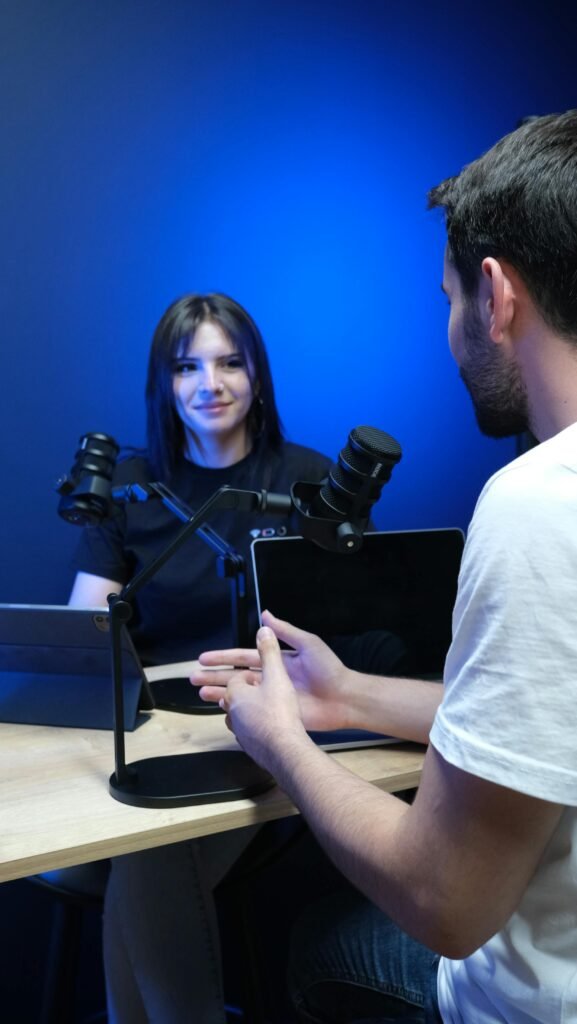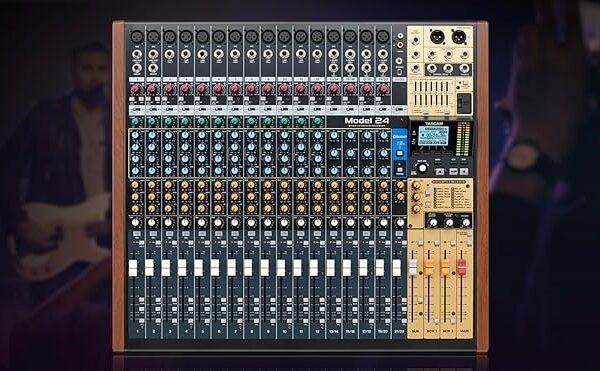How to prepare for a smooth and engaging podcast interview? Fear not, aspiring podcast guest! This comprehensive guide will walk you through every step, transforming interview jitters into interview confidence.
Pre-Interview Preparation
Sam Datta-Paulin, executive producer at Lower Street and former journalism instructor, lends his special knowledge to teach you everything you need to know about doing a podcast interview.
We are discussing every insider tip there is.
1. Finding the Right Guest
Every podcaster aims to make their show as valuable as possible for listeners.
The right guest can elevate your content and keep listeners hooked.
Before diving into the interview process, let’s explore how to find and approach the perfect guest for your podcast.

“Finding the right guest is a mix of researching people with something to say, and people who can tell their story well.” —Sam Datta Paulin.
Do some field research before reaching out to potential guests—because sending random invitations to people who aren’t a good fit for your podcast is a waste of time (for both of you).
Most of them will likely ignore or decline your request, and honestly, who can blame them? If their audience doesn’t align with yours, it’s a lost opportunity for everyone.
The key to strong content continuity is making sure your guests’ expertise, audience, and message complement your podcast’s niche.
A great approach?
Find thought leaders in your space.
Sam, an experienced podcaster, shares his method: “
I tend to start by searching highly regarded articles and blog posts in my niche, then tracking down the author and seeing if they’ve done any public speaking or media.”
This strategy works because writers and speakers who are already making waves in your industry have valuable insights—and they’re often open to discussing their expertise on relevant platforms.
Another powerful tactic?
Listen to similar podcasts.
If other shows in your niche have featured engaging and knowledgeable guests, chances are, they’d also be a great fit for your listeners.
Check out their past guest lists, listen to their interviews, and reach out with a personalized invitation.
A study by Podcast Insights (2023) found that 67% of podcast listeners actively seek out shows based on the guests featured, meaning the right guests can attract new listeners to your podcast as well.
And of course, don’t forget online resources! Platforms like LinkedIn, Twitter, and industry forums are goldmines for finding experts in specific industries, companies, and niches.
Search for professionals who align with your audience’s interests, check if they’ve been featured in media or podcasts, and send them a well-crafted pitch explaining why your show is the perfect platform for them.
The bottom line? Podcast guest research isn’t just about booking big names—it’s about finding people who bring genuine value.
Take the time to curate guests strategically, and you’ll not only create better content but also grow your audience in a meaningful way. 🎙️🔥
How to Approach Your Ideal Guest
It’s time to get in touch with the ideal guest once you’ve located them.
It’s no secret that the majority of our networking takes place online these days.
Therefore, it’s likely that you’ll reach out to a prospective visitor by email or direct message them on social media.
Find people’s email addresses: Rocketreach is an excellent resource for finding professionals.
As an alternative, getting in touch with people through social media, LinkedIn, or their website is also effective.
Top advice: Don’t go through any assistants or their press reps.
It will feel more intimate to speak with the person personally, and messages won’t be misunderstood if you do so.
“There are two ways to approach a guest—either you can appeal to this being something fun, or you can market it as a good business opportunity (or both!),” says Sam.
- Start the conversation by highlighting the value of your podcast. Emphasize the benefits of your podcast to get the conversation started. For instance, “Our show talks about [industry or niche] and [explain the value of your show].”
- Tell them exactly what you need from them. I’m reaching out to you because I enjoyed your work on [website/podcast/social media] and would love to have you discuss [particular issue] on my show.
- Make a precise reference. It demonstrates your sincerity to bring up any pertinent studies, articles, projects, or professional achievements they have accomplished: “In researching your work, I found [insert a point about their work] and feel my audience would also enjoy hearing about it.”
- Mention what they will get from it: The podcast reaches [enter average listener numbers] a week, so it would be a great opportunity for you to promote yourself and your work to a like-minded audience.
- Complete the following steps: Kindly respond to indicate your availability or get in touch if you have any more inquiries; I’d be happy to discuss more.
Keep the introductory email short. Briefly discuss who you are, what you want from them, and your following actions.
2. Be Clear About the Podcast Format
Without a clear plan for the interview’s flow, it is impossible to conduct a good interview.
And let me clarify: I’m not saying you have to host or manage shows in the same way as everyone else in the industry.
However, it makes you better prepared and makes it easier for your listeners to binge when you’re clear on the kinds of questions you’re going to ask, the length and pace of the show, and maybe one or two questions that you’ll ask each guest.
Choose the type of show you want to produce, be consistent with it, and feel free to make modifications as needed.
Just be sure you’re sharing them with both your audience and your visitors.

3. Pre-Interview Prep: Laying the Groundwork
A strong foundation is key to a successful interview. Here’s how to ensure you’re ready to shine:
- Craft a Compelling Introduction:
- Write a short script introducing your background and expertise. This keeps you on track and allows the host to easily weave your bio into the conversation.
- Connect on Skype:
- Ensure seamless communication by adding the host on Skype beforehand.
- Master the Pronunciation:
- Avoid awkward stumbles! Practice pronouncing the host’s and your own name clearly. A quick YouTube search can be your pronunciation savior.
- Chart Your Course:
- Prepare interview questions and the flow of your conversation. Consider using Google Drive for easy access during the interview.
4. Sending a Pre-Interview Survey
Sending out a pre-show form for your visitors to complete is beneficial for everyone, even if you believe you know them really well.
In contrast to public material you can acquire on the internet or through casual discussions, it helps you gather information directly related to your program and gives your guest a sense of the kinds of questions you prefer to ask.
These forms don’t have to be lengthy, but they could contain queries and information such as:
- Details on the way you record your program
- Details about your normal listeners and what they hope to get out of the podcast
- How is your name pronounced?(This saves you time from having to ask questions on the actual recording!)
- Why are you the only person who can talk about [TOPIC]?
- What bizarre yet real fact about you is there?(This may serve as a connecting point for you and the visitor.)
- What makes [TOPIC] so essential to you?
- What would be the one piece of advise you would give the audience if you could?
And so on.
You can make these forms your own, but be sure to make them simple enough for your guest to fill out, so you’re not overstepping your bounds.
5. Create Set Recording Times
Although I recognize that not everyone has a consistent schedule, it can be beneficial to establish specific times each week or month for recording.
Making a strategy is advantageous for several reasons:
- To prevent double booking, you (as well as everyone on your team) will be aware that your schedule is restricted to very particular times.
- You won’t have to keep asking visitors to clarify who is accessible where and when.
- Until a guest is unable to attend for any reason, your scheduled times are final. You’ll be better equipped to safeguard your schedule as a result, which is crucial for successful professionals.
- You can schedule the remainder of your week or month around such moments to ensure that you are in the best possible mood to be an excellent host.
If you aren’t able to set aside the same times for your podcast recordings, at least try to batch them.
When you can schedule two recordings back to back, it helps.
5. Minimize all the Distractions
You have no idea how much noise I have had to (or have tried to) cut out of podcast recordings. Some are unsalvageable.
Distractions, however, don’t only happen when you get calls and emails.
There are mailmen and women, dogs barking, and messages on social media. The list is endless.
When scheduling recordings, attempt to record during times when your infant is often asleep, the mail has arrived, or people aren’t stopping by the kitchen to reheat leftovers.
Put the dog in the other room, turn off Facebook and email on your phone, put your phone in airplane mode, and save your lunch till after your recording is done.

6. Prepare for Podcast Interviews Ahead of Time
Making a lasting impression during your interview and engaging the audience are all made possible by being well-prepared.
Let me go over some critical preparation tasks for your big day.
Set Up the Recording Space
Your environment is a big factor in getting a good recording for virtual interviews. Select a space that is peaceful, well-lit, and allows you to concentrate without distractions. The secret to preventing any technological issues is having a dependable internet connection. For in-person podcast interviews, knowing where the interview will take place and how to get there in advance will help you stay composed and on schedule.

Check the Equipment
Problems with technology can break the flow of an interview.
Try out your headphones, microphone, and any necessary software before the interview.
For clear audio capture, place your microphone in the ideal location.
By reducing echo or feedback, headphones can improve the overall quality of your podcast interview.
Dress Accordingly
You can feel more confident if you dress well, even if the podcast is not visually focused.
When going on video interviews, think about how you come across on camera. Dress professionally by selecting colors and fits that seem nice.
Structure the Interview
When you’re first learning about the genre of podcast interviews, it can be quite helpful to have a basic format you can use to create excellent interviews.
Successful interviewing is a skill that requires practice and mastery.
It wasn’t always the case that hosts like Nate Silver, Marc Maron, and Joe Rogan were skilled interviewers.
You’ll become more adept at conducting interviews if you know how to organize the podcast, and before you know it, you’ll be competing with the big boys.
How to Structure Podcast Interview Questions
These are some pointers to keep in mind when coming up with questions:
- Steer clear of simple queries that only yield cursory responses that leave little opportunity for further investigation.
- Avoid posing yes/no queries.
- Avoid posing leading queries, or queries that imply a certain response.
- One question at a time, pose it
It’s crucial to consider your audience when you structure your queries.
What do you think the visitor would be most interested in talking about?
Ask both serious and playful questions, and remember that your guest’s answer may completely change the course of the conversation.
Put differently, be ready to let go of your questions and just go with the flow!
- Open-ended questions: Introduce yourself and ask a few open-ended questions to pique your guest’s interest in sharing their background and start a conversation.
- Questions to follow up on: Depending on the guest’s responses, you can ask them to elaborate on their comments or provide more details in a follow-up question.
- Contextual questions: Putting things in perspective for listeners can be achieved by asking the guest about their experiences (upbringing, schooling, professional path, etc.).
- Personal anecdotes: Nature tells stories to humans. By inviting your visitor to share personal tales, you may humanize the discussion and increase the audience’s level of engagement and relatability.
- Questions for insight and guidance: The goal of having guests on your podcast is to learn something new and stimulating from them. Make sure the questions you pose encourage your guest to offer their opinions and suggestions on a certain subject.
Should You Send Interview Questions Ahead of Time?
If you send your podcast guest the questions ahead of time, they might respond with dishonesty.
You will frequently lose that element of spontaneity when you get down to record if they have had a lot of time to prepare fully baked answers—something that listeners can pick up on.

Sharing the questions runs the risk of making them overly prepared and allowing them to read from their notes, which will make the interaction awkward.
Send a list of the subjects you want to address in bullet points instead of questions.
“I also make it clear that if there are any questions they can’t answer during the interview, that’s fine.
They are also welcome to prompt me to ask a question differently—or tell me on-air why it’s a bad question.
Sometimes that makes great content, and a great avenue of conversation can come from it!”
Show Note Savvy: Setting the Stage
The show notes are your audience’s first impression. Here’s what to include:
- Guest Bio:
- Include the guest bio provided during booking. This showcases your guest’s credentials and expertise.
- Product or Service Pitch:
- If applicable, incorporate any product or service the guest wants to promote.
- Air Date:
- Spark anticipation by including the upcoming episode’s air date.
- Episode Number:
- Make your guest feel valued by highlighting the episode number (especially for new guests).
- Spread the Word:
- Encourage guests to promote the episode – a win-win for both of you!
During the Interview
Record as soon as the sound and equipment are checked (even before you start the interview).
Asking them about their lives, including where they are, what they’ve been up to, how their family is doing, and how they are feeling, is worth taking up five minutes or so.
Small chat can be awkward at first, but it helps people relax, warms up their voices, and establishes a sense of familiarity between the host and the guest.
Demonstrate to them your composure, your daily practice, and your sincere interest in them.
Make it obvious that this is a conversation, not an interrogation, and get them used to being in a recorded one.”
Introducing some serenity and lighthearted banter helps guests de-stress before the interview. The host benefits from it as well!
Ask those Clarifying Questions
Asking clarifying questions is a great way to learn much more about a subject.
It takes practice to know when and how to ask clarifying questions.
It can, however, aid the listener in understanding what your guest is saying once you become accustomed to spotting the correct occasions.

Ask questions about when, why, where, or how to get your guest to elaborate.
Allow them to elaborate on their ideas and thoughts so they can get even more clear.
You can also restate your guest’s remarks and ask them to affirm or refute that this is what they intended to say in order to help your audience follow along.
Examples of clarifying questions:
- What did you mean when you said …?
- Can you give me an example?
- What was your reaction to that?
Engage in Active Listening
For an interviewer, active listening is an essential skill that they should definitely practice.
When you listen with complete attention, you demonstrate to the speaker that you have heard them as well as hearing what they have to say.
React to demonstrate that you are “present” if you can see each other.
As an illustration, give a grin, nod, shake your head, and make eye contact,” Sam says.
In daily interactions, we could practice active listening and respond to what is stated by making sounds like “uh-huh,” “yeah,” “right,” etc.
However, when heard on audio, listeners may perceive that as impatience, being impolite, and bothersome.
But, by engaging with the guest non-verbally, they’ll feel at ease and valued, and you’ll notice nuances in the conversation that can be picked out and discussed.

Know When To Interrupt
Although being courteous is always a good idea, there are instances when it is OK to interrupt a guest.
You should be able to interrupt and steer the conversation in a different direction or pose a clarifying question—even in the middle of a sentence—as long as you time it correctly.
“Interrupting isn’t always the worst thing in the world,” Sam asserts.
“Remember, nevertheless, that they are visitors. Let them speak; you’ll have plenty of time to express yourself.”
Always try to be engaging in discussion, and don’t hesitate to delve deeper into a topic that interests you. Just saying “Sorry to jump in”, but I need to ask you more about that,” will suffice. It’s not rude; it’s conversational.
“Don’t let the guest walk all over you. Stop them and move on if they go off-piste or talk for 20 minutes uninterrupted!”
Have Fun!
It’s easy for an interviewer to become bogged down in the specifics of crafting an engaging discussion.
Having fun is one of the most important advices for any podcast host, even though the specifics can be important.
If listeners can tell that the host and guest are having a good time together, the conversation will always be more substantive.
Find common ground, have a good argument, laugh, joke, make mistakes, and discuss a topic of interest together.
Enjoy the conversation, no matter where it goes.
Handling Difficult Situations
It’s important to consider what not to do as well as what to do while doing a seamless and engaging audio interview.
Avoiding frequent mistakes can help keep the atmosphere professional and the audience engaged the entire time.
The following are some things not to do in a podcast interview:
Avoid using technical jargon
It’s crucial to show off your knowledge without overloading your audience with technical terminology or complicated language that could be confusing to people who don’t understand them.
Make an effort to communicate your views in plain, understandable terms to others.
Take a moment to explain any specialized phrases that are necessary in plainer language.
Using this tactic will guarantee that your message is understood by the audience and that it is clear.

Remember to mute your phone or any other devices
Unexpected pauses or background noise can detract from the interview’s quality and interfere with the listener’s experience.
Make sure all of your electronics are in “do not disturb” or silent mode before the interview begins.
Phones, tablets, and other devices that might produce noise or be distracting fall under this category.
You may contribute to a more polished and seamless interview environment by reducing any disruptions, which frees up both you and the host to concentrate on the discussion.
Remember that the goal of every podcast interview is to give listeners an engaging and educational experience.
Achieving this goal will be substantially aided by avoiding these problems.
Post-Interview Follow-Up and Relationship Building
As important as the preparation and the actual interview are the moments that follow your podcast interview.
Post-interview protocol reflects your professionalism and can improve your rapport with the podcast’s host and listeners.
Here are some pointers for successfully negotiating this stage:
Express gratitude: Always start by thanking the host for providing you with the chance.
Gratitude expressed with a brief email or note can go a long way toward establishing rapport.
It’s a way to show appreciation for the host’s work and the platform they provide for you to share your knowledge or experience.
Distribute the Episode: As soon as the episode gets up, share it on all of your social media platforms.
Don’t forget to tag the official podcast account and the host to increase its visibility.
This shows your support for the podcast and aids in promoting the episode.
By sharing it, you and the presenter can draw in more listeners.
Interact with Audience Members: Respond to listeners on social media or other platforms who leave comments or pose inquiries on the program.
Answering questions from the audience helps you build a rapport with them and demonstrates your devotion outside of the interview.
This kind of communication can foster a more devoted fan base and open doors for potential future partnerships.
Offer to Expand Your Reach: Offer to help promote the episode more if necessary.
After its debut, some podcasts plan follow-up marketing events like Q&A sessions in real time or social media takeovers.
Ask for Input: Ask the host for feedback on your participation; it can provide insightful information about how you performed and how to improve for upcoming interviews.
It illustrates your commitment to developing professionally and making a constructive contribution to podcast conversations.
Continue to Communicate: Building strong professional relationships can be facilitated by responding to postings made by people on social media, participating with their content, and continuously supporting their podcasts.
Keeping up with the most recent advancements in your profession or even forging future collaborations could benefit greatly from this network.
Beyond the Interview: Building Relationships
The interview is just the beginning. Leverage this opportunity to connect on a deeper level:
- Dream 50 Advantage:
- Remember, the host is likely someone you admire. Use this chance to build rapport and explore potential business collaborations.
- Become an Information Wizard:
- Keep your Airing Schedule document open during the interview. This allows you to reference past guests and insights, showcasing your knowledge and making insightful connections.
- Double Duty Display:
- Split your screen with your script and Airing Schedule documents on one side and Skype on the other. This allows quick access to information and helps avoid embarrassing “name slip” moments.
- Record with Ease:
- Ensure your recording software is readily accessible for a seamless start to the interview.
- Test, Test, Test:
- Conduct a test call with Skype to confirm your microphone and headset are working flawlessly.
- Record, Don’t Forget!
- Click “record” as soon as your guest answers. Pre-interview chit-chat can be engaging, but recording only matters when the interview officially starts.
- Leave Room to Edit:
- After the interview, leave a few seconds of silence. This “dead air” allows your editing team to create a clean transition point.
- Wrap Up with Appreciation:
- Thank your guest for their time and expertise. This fosters goodwill and leaves the door open for future collaborations.
- Document Your Success:
- Update your Airing Schedule with the guest’s name, interview completion status, and audio file location – a helpful checklist for your editing team.
- Additionally, note any preferred episode air date or number to keep everyone informed.
Bonus Tips for Podcast Interview Domination
Here are some additional insights to ensure a stellar interview:
- Dress for Success:
- While you won’t be on camera, projecting professionalism through your attire boosts your confidence and interview presence.
- Hydrate and Relax:
- A clear voice and calm demeanor are essential. Stay hydrated and take deep breaths to combat interview jitters.
- Active Listening is Key:
- Pay close attention to the host’s questions and respond thoughtfully. Avoid interrupting or going off on tangents.
- Embrace Storytelling:
- Weave anecdotes and personal experiences into your responses to make your interview engaging and relatable.
- End on a High Note:
- Conclude the interview with a strong takeaway or call to action for your audience.
Conclusion
By following these steps and incorporating these valuable tips, you’ll transform yourself from an interview novice into a podcast pro.
Remember, preparation is key.
We have a some Book Recommendations on how you can become the champion in podcasting. Check em out now!!
Into Podcasting? Podcasting is a different game, and without a precise blueprint, the game will get tougher midway. Grow your podcast from scratch with Zero Audience and learn about how successful podcasters cracked the code by winning our Free Guide with step by step Guidelines.
Get your complete podcast equipment setup by visiting Podcast Equipment Bundle. Get in touch with podcasting services and experts those will save you tons of time at Podcast Production Services.
With that being said, Let’s connect with all such free and paid tool/services you might need knowingly or unknowingly to fuel your growth. Here’s 21 BEST AI TOOLS AND PLATFORMS TO GROW YOUR PODCAST AND CONTENTS. There are some bonus tools in the end too to make your day to day life easier.
There are some affiliate links on this page that will redirect you directly to the original products and services. Also by buying through those links you will be supporting us. So thank you ^.^



